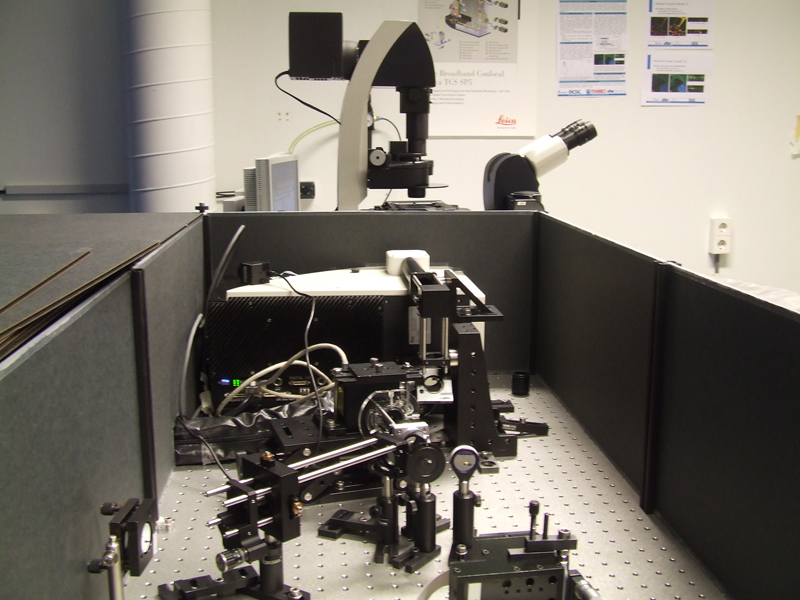Smart Optics Systems programme (Funding: STW Perspectief)
Integrated Smart Microscopy
| Applicants: |
Prof. Paddy French (TU Delft) (project leader) Dr. Gleb Vdovin (TU Delft / Flexible Optical BV) Prof. Michel Verhaegen (TU Delft) Prof. Lina Sarro (TU Delft) Dr. Georg Schitter (TU Vienne, Austria) Prof. Wiro Niessen (TU Delft / Erasmus MC, Rotterdam) Dr. Erik Meijering (Erasmus MC, Rotterdam) Dr. Adriaan Houtsmuller (Erasmus MC, Rotterdam) Dr. Gert van Cappellen (Erasmus MC, Rotterdam) |
| Partners: | Leica Microsystems |
| Researchers: |
Dr. Martin van Royen (Erasmus MC, Rotterdam) Dr. Ihor Smal (Erasmus MC, Rotterdam) Hans Yoo (TU Delft) Dr. Darco Simonovic (TU Delft) |
|

The Leica TCS SP5 II microscope test set-up
| |
| Project outline: |
Optical microscopy and fluorescent labeling technologies have gone through impressive progress in the past decades and have provided powerful instruments for biomedical research. Especially the availability of a large variety of fluorescent proteins, including photoactivatable and -switchable mutants, has revolutionized live cell imaging. Quantitative investigation of the molecular mechanisms responsible for normal biological function of living cells and organisms, but also aberrant processes in diseases such as cancer, Alzheimer's, and Parkinson's, requires very precise localization of active factors inside subcellular organelles, as well as the structure and dynamics of active chromatin sites inside the cell nucleus. For such studies, the resolution of commercially available optical (confocal) microscopy systems is a very limiting factor. In a practical setting, the loss of performance compared to theoretical values is largely due to the mismatch between the refractive index of the specimen. Especially in a confocal setup, this mismatch increases with increasing depth of penetration into the specimen. Microscope systems available today are generally based on fixed optical setups, and are unable to correct for dynamic, higher-order wavefront aberrations due to distortions in the optical path, or manufacturing inaccuracies. Smart optics and control systems have a high potential to serve as enabling technologies to address this problem. Therefore, the aim of this multidisciplinary project is to develop and evaluate an integrated smart confocal microscoppe for live cell imaging, which combines adaptive optics in the imaging path with adaptive postprocessing of the resulting 3D image data. This requires optical systems research (design and integration of adaptive optics components), control systems research (real-time control for improved scanning, active compensation, and adaptive optics), image processing research (adaptive filtering, deconvolution, detection, and tracking), and biomedical research (evaluation of the new system by application to biomedically relevant problems). |